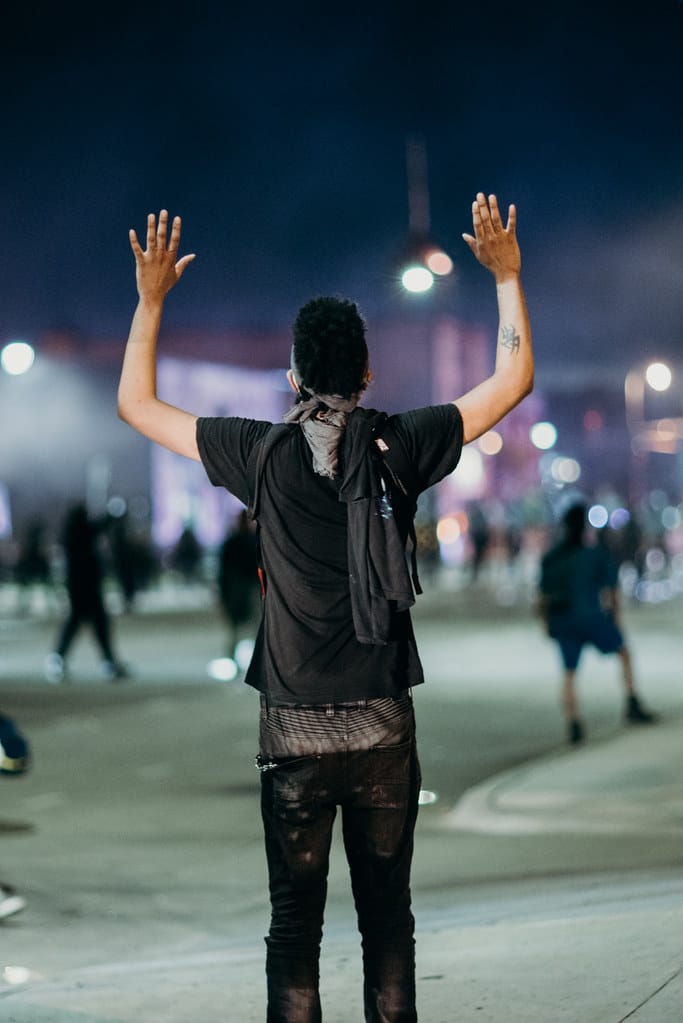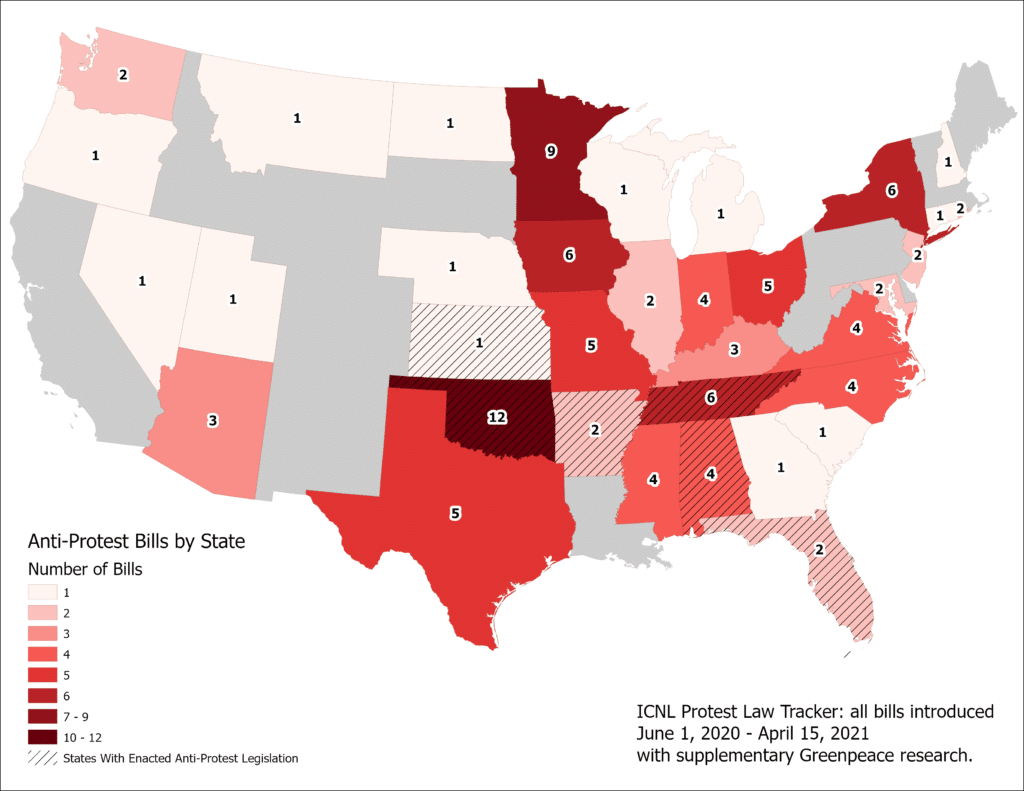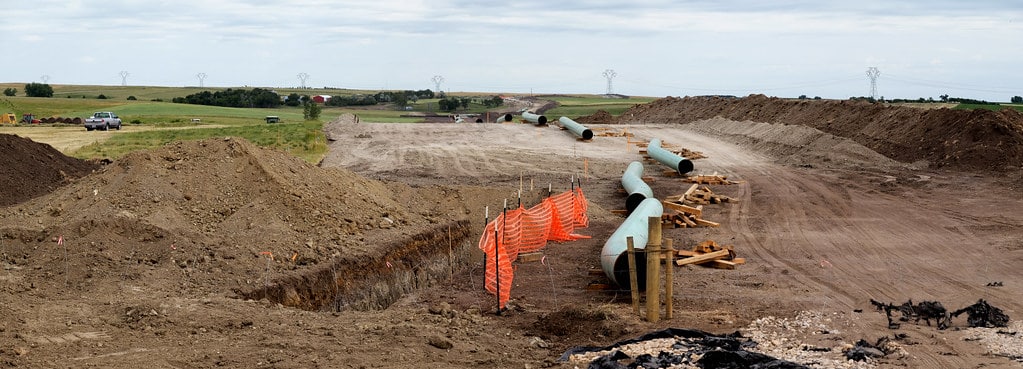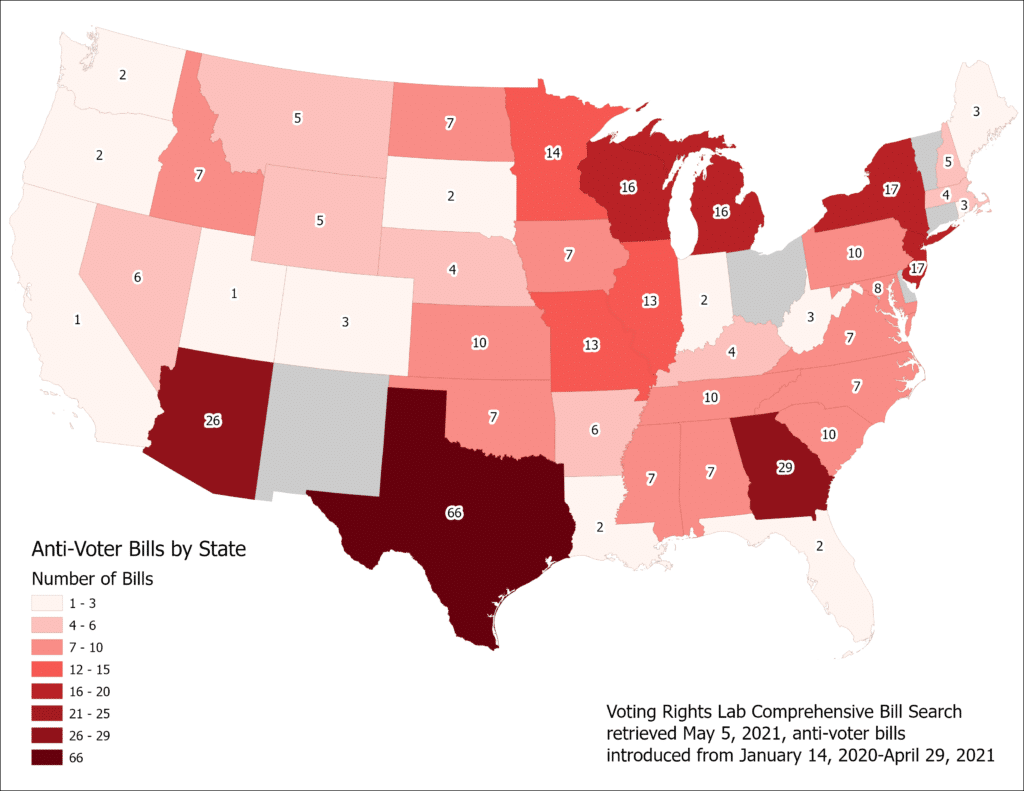Since the start of the year, conservative lawmakers have promoted and enacted legislation in state capitols that seek to make it harder to vote. At the same time, state legislatures are passing laws to impose harsh punishments on public protests.
The dual efforts, aimed at subverting democracy, are also targeted to constrain the growing campaigns for racial and climate justice, and they have been aided by prominent corporations, according to a new report from Greenpeace.
Greenpeace found that there are 44 state legislators around the country that have both sponsored at least one anti-voter bill and one anti-protest bill, evidence of the overlap between the crackdowns. The efforts to suppress the vote and criminalize protest are “both consistent with a contempt for democracy,” Charlie Cray, one of the authors of the report, told DeSmog.
There is also overlap in the corporate backers of those legislators. Of the top 100 corporate donors to state lawmakers pushing anti-voter bills, 53 of them were also among the top 100 donors to anti-protest bill sponsors. Five companies — AT&T, Comcast, RAI Services, Phillip Morris/Altria, and UnitedHealth Group — ranked in the top 10 of companies that financially backed sponsors of both anti-voter and anti-protest bills.
Meanwhile, the report found that oil and gas companies, including Marathon Petroleum, ExxonMobil, and Koch Industries, had the largest lobbying presence in support of anti-protest bills over the past five years.
These calls for more restrictive policies “are direct responses to very powerful democratic movements,” said Cray.
As of March, state legislators around the country have introduced 361 bills in 47 states this year to curb access to voting in some form, according to the Brennan Center for Justice. On May 11, Arizona became the latest example of this trend when Governor Doug Ducey signed into law legislation that will remove infrequent voters from the state’s ballot list.
Less than an hour after its passage by the Arizona State Senate, Governor @DougDucey rushed to sign SB 1485, a devastating anti-voter bill which could remove over 125,000 voters–more than 30,000 of whom are Latino–from Arizona’s highly popular Permanent Early Voting List. (1/6)
— Stacey Abrams (@staceyabrams) May 11, 2021
The voter suppression law signed into law in Georgia on March 25 gained national attention for banning mobile voting, restricting ballot drop boxes, imposing strict voter ID, and even making it a crime to hand out water while people wait in line. These measures disproportionately impact Black and Brown voters, according to the Georgia NAACP, which is suing the state.
Efforts to restrict voting came in response to a 25 percent increase in Black voting in Georgia during the 2020 presidential election, which helped narrowly elect President Joe Biden and two U.S. Senators in a runoff election in January.
A parallel effort in state capitols has targeted the right to protest. This trend first emerged following the 2016 violent crackdown of water protectors opposing the construction of the Dakota Access pipeline. North Dakota lawmakers quickly passed legislation that increased penalties for “rioting.” Since then, another 15 states have increased penalties for protests that disrupt “critical infrastructure,” including several just this year.
The legislative trend started as an effort to punish opponents of oil pipelines, but Republican-controlled legislatures pursued anti-protest bills with renewed vigor in the wake of the nationwide protests in 2020 over police killings of unarmed Black people.

In April, Florida enacted a law that Republican Governor Ron DeSantis initially proposed last year following racial justice protests. The new law makes it a felony to block traffic and creates new types of crimes for “rioting.” Most glaringly, it gives immunity to drivers who use their cars to hit protesters as long as they claim they feared for their safety. The Broward County Sheriff’s office told its deputies not to enforce the law unless absolutely necessary over concerns that it would violate civil rights.
“Our protest movement was vibrant, intersectional, peaceful, Black led and diverse,” Nancy Metayer, who was involved in the 2020 racial justice protests in Coral Springs, Florida, told DeSmog in an email. She was later elected as the first Black and Haitian-American woman to the Coral Springs City Commission. “This law is a power grab from an unchecked governor who never responded to questions of protesters who sought answers and change; this law was his only response.”
She added that voter suppression and anti-protest legislation is not something new, but “is part of a continued effort to disenfranchise black and brown people in this country which goes back decades,” she said. “These are modern day adaptations of Jim Crow era thinking and policy, the similarities are not a coincidence.”
Corporate Influence
In many cases, it is hard to definitively say that financial donations to state legislators is proof of a desire to see anti-democratic legislation, especially since powerful corporations seek influence for a variety of reasons. However, at a minimum, the financial support for lawmakers promoting extremist policies means that these corporations are at least associated with this movement. “Do they want to be associated with such radical anti-democratic policies? That’s the question that we’re pointing to,” Cray said.

AT&T was the top donor to politicians sponsoring anti-voting and anti-protest legislation, giving $228,000 between June 1, 2020 and March 25, 2021, according to Greenpeace. Koch Industries and its subsidiaries came in second, giving more than $151,000. AT&T and Koch Industries did not return a request for comment.
Companies may donate for a number of reasons, but direct lobbying points to more direct links since it involves specific legislation.
Greenpeace found that oil and gas companies “directed by far the most resources to lobbying for anti-protest ‘critical infrastructure’ bills introduced between 2017 and 2021, holding eight of the top 10 spots.” The list includes Marathon Petroleum, ExxonMobil, Koch Industries, Enbridge, TC Energy, Valero, CenterPoint Energy, Energy Transfer, Magellan Midstream, and Dominion Resources. As the Intercept reports, law enforcement organizations have also lobbied in favor of anti-protest bills.
The specifics of each state’s anti-protest law vary, but generally they all involve steeper punishment — upgrading misdemeanors to felonies, higher monetary penalties, and longer jail sentences — for protesting or disrupting “critical infrastructure,” which typically refers to an oil pipeline, refinery or some other fossil fuel facility.

For instance, In 2017, a lobbyist for Valero Energy, the second largest oil refiner in the country, urged Oklahoma’s Governor to sign an anti-protest bill that creates fines of at least $10,000 for trespassing at critical infrastructure. In 2018, Energy Transfer used private security contractors to arrest protesters of the Bayou Bridge pipeline in Louisiana, under the authority of the state’s recently enacted critical infrastructure anti-protest law. Valero Energy and Energy Transfer did not respond to a request for comment.
The Montana legislature recently passed legislation that makes trespassing at critical infrastructure punishable by up to 18 months in prison. If someone causes more than $1,500 in damage, they could go to jail for 30 years. A similar anti-trespass bill was introduced in February in Minnesota, where the state has been known to track pipeline opponents by communicating with police in at least three states. The police in turn, have in the past received information about activists via private security companies working with pipeline company Enbridge.
“We recognize people’s right to express their views legally and peacefully and to engage in peaceful, non-violent protests. We don’t tolerate trespassing, vandalism, or mischief, and Enbridge will seek to prosecute those individuals to the fullest extent of the law,” Michael Barnes, a spokesperson for Enbridge, said in an emailed statement to DeSmog.
The anti-protest laws also divert attention from the pollution and safety threats to local communities from major energy facilities, the report states. For example, Koch Industries cites anti-protest bills as needed to ensure public safety, but “they have a long record of being one of the most aggressive lobbying forces in Washington against chemical security legislation,” Cray said. “If you’re concerned about these communities, then make your operations more inherently safe and there will be less risk of some kind of catastrophic accident or sabotage.”
Pro-Democracy Reform
In a hearing in the Montana Senate on April 1, several Indigenous people spoke out against the state’s proposed anti-trespassing bill. “I would like to state that our Tribes were not consulted at any point during the [Keystone XL pipeline] discussion, which was to be built on the west side of our reservation,” Fort Peck Tribal Councilman Jestin Dupree said. The Fort Peck Reservation is located in northeastern Montana, and the Tribes have long opposed the pipeline. Dupree denounced the harsh penalties spelled out in the bill. “This is unfair … This shows that the drafters of this bill think that the intent of large oil corporations is more important than our citizens,” Dupree said.

In some cases, major corporations have spoken out against the anti-democratic turn. On April 14, the Black Economic Alliance organized a statement of over 500 companies and CEOs condemning anti-voter legislation in state capitols. “We all should feel a responsibility to defend the right to vote and to oppose any discriminatory legislation or measures that restrict or prevent any eligible voter from having an equal and fair opportunity to cast a ballot,” the statement said. “Voting is the lifeblood of our democracy and we call upon all Americans to join us in taking a nonpartisan stand for this most basic and fundamental right of all Americans.”
In an interview with DeSmog, Cray of Greenpeace said this was an important signal, but that the business community needs to go further by supporting the passage of the For the People Act — legislation that would expand ballot access and shine a light on dark money. The ability to funnel large donations in opaque ways has facilitated corporate messaging for years, allowing companies like Koch Industries, for example, to fund think tanks and nonprofit advocacy groups that peddle climate denial.
Politicians and companies should also support the John Lewis Voting Rights Act, Cray says, which would restore parts of the 1965 Voting Rights Act that was dismantled by the Supreme Court in 2013. The two bills together would amount to the most sweeping pro-democracy reform in more than half a century, according to the Brennan Center for Justice. They have already passed the U.S. House of Representatives and await action in the Senate.

But powerful business interests stand in the way. Cray said that while parts of Corporate America express support for racial justice and democracy, they need to more explicitly advocate for pro-democracy legislation. They also need “to tell the U.S. Chamber of Commerce to stand down because the U.S. Chamber is the most aggressive lobbying force right now on the Hill against the For the People Act,” Charlie Cray said.
The U.S. Chamber of Commerce is one of the most powerful corporate lobbying entities in the country, and it has come out against the For the People Act, decrying measures that would require disclosure of high-dollar campaign contributions and require transparency for online advertising.
And according to Greenpeace’s report, at least six state and regional affiliates of the U.S. Chamber have also lobbied in favor of anti-protest laws.
The Chamber of Commerce did not respond to a request for comment.
Subscribe to our newsletter
Stay up to date with DeSmog news and alerts







